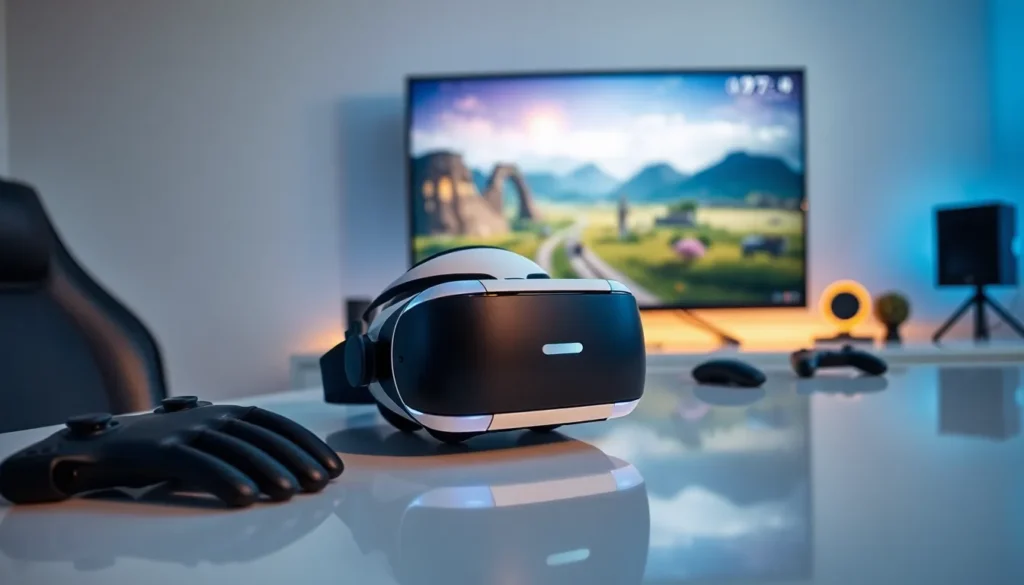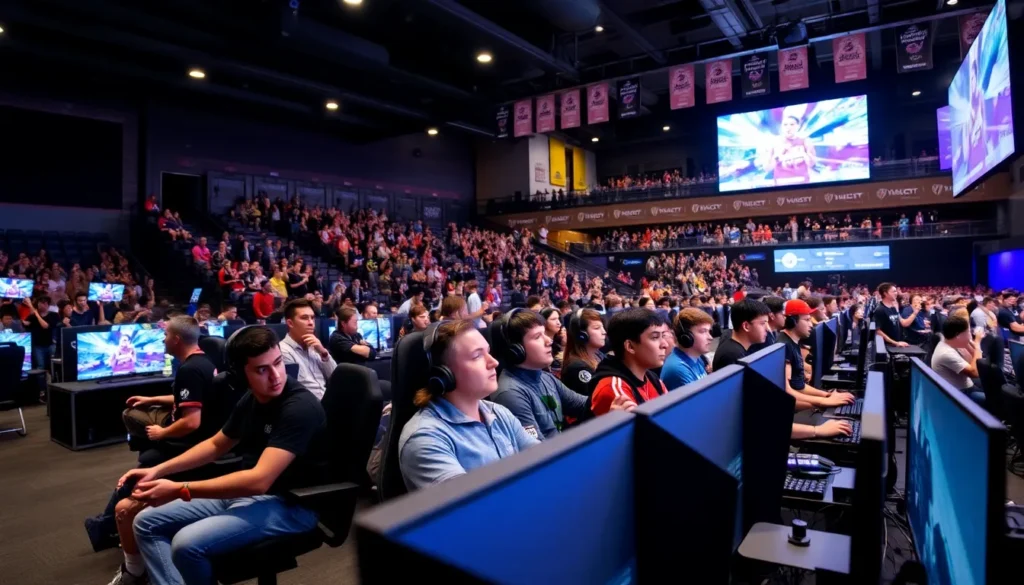Table of Contents
ToggleThe PC gaming economy has evolved into a dynamic powerhouse, shaping not just entertainment but also technology, commerce, and culture. With millions of players worldwide, the industry generates billions in revenue, driven by everything from hardware sales to in-game purchases. As gaming becomes more mainstream, understanding its economic impact is crucial for both enthusiasts and investors alike.
This thriving ecosystem encompasses a diverse range of elements, including game development, streaming platforms, and esports. It’s not just about playing games anymore; it’s about building communities and creating new opportunities. As the landscape continues to shift, exploring the intricacies of the PC gaming economy reveals the potential for growth and innovation in this ever-expanding market.
Overview of PC Gaming Economy
The PC gaming economy encompasses various components that contribute to its substantial growth and evolution. This sector generates significant revenue, surpassing $40 billion annually, driven by hardware sales, software sales, subscriptions, and in-game purchases.
- Hardware Investment: Manufacturers continuously innovate, producing high-performance graphics cards, processors, and peripherals. Gamers often invest in gaming rigs costing from $500 to over $3,000.
- Software and Game Sales: Digital distribution platforms, such as Steam and Epic Games Store, dominate game sales. Titles can range from $10 to $60, with many developers offering ongoing downloadable content (DLC) and expansions.
- In-Game Purchases: Players often spend on microtransactions, enhancements, and cosmetic items. Many games report that in-game purchases account for up to 70% of their total revenue.
- Esports Industry: Competitive gaming has emerged as a lucrative facet of the PC gaming economy. Prize pools for major tournaments often exceed $30 million, attracting sponsors and a global audience.
- Streaming and Content Creation: Platforms like Twitch and YouTube facilitate monetization opportunities for streamers. Successful content creators can earn from advertising, subscriptions, and sponsorships, making it a viable career option.
- Community Engagement: Game developers increasingly prioritize user feedback, creating communities around titles. Participating in forums or social media groups cultivates loyalty and enhances user experience, leading to sustained sales.
- Emerging Technologies: Innovations such as virtual reality (VR) and augmented reality (AR) are transforming the gaming landscape. As these technologies become mainstream, new revenue streams and gameplay experiences arise.
Understanding the intricacies of the PC gaming economy provides insight into its expansive reach and growing influence. This knowledge is crucial for both gamers looking to maximize their investment and investors seeking opportunities in a dynamic market.
Key Components of PC Gaming Economy

Key components of the PC gaming economy include hardware investments, software sales, and the role of digital distribution platforms. Each aspect plays a critical role in shaping the industry’s landscape and driving economic growth.
Hardware Market
Hardware investment remains pivotal in the PC gaming economy. Manufacturers continuously innovate to produce high-performance components, such as graphics cards, processors, and gaming peripherals. In 2023, the global gaming hardware market reached approximately $47.5 billion, fueled by demand for advanced gaming rigs capable of supporting immersive graphics and high frame rates. Gamers often spend significant sums on upgrading their systems, including peripherals that enhance their gaming experiences. This dedication to hardware supports a competitive marketplace where quality and performance drive consumer choices.
Software Market
The software market constitutes a major segment of the PC gaming economy. The sector generates significant revenue, estimated at $29 billion annually, driven predominantly by game sales, expansions, and downloadable content (DLC). Popular titles can earn hundreds of millions within a short window of release. As the gaming landscape evolves, trends in subscription models, such as Xbox Game Pass and EA Play, shift consumer spending habits. These services offer libraries of games for a monthly fee, broadening access and engagement for players.
Digital Distribution Platforms
Digital distribution platforms have transformed how games reach consumers, with Steam leading the charge. In 2023, Steam accounted for around 75% of the PC game market share, showcasing the platform’s dominance. These platforms not only streamline purchasing but also offer features like community forums, updates, and mod support. Moreover, developer tools on these platforms enhance the chances for indie games to gain visibility. The digital marketplace fosters transactions that support both established franchises and emerging talent, reinforcing a robust gaming ecosystem.
Impact of Streaming and Content Creation
Streaming and content creation significantly influence the PC gaming economy by driving engagement and generating revenue. Platforms like Twitch and YouTube reshape how gamers interact, build communities, and financially support their favorite creators.
Influence of Twitch and YouTube
Twitch and YouTube play crucial roles in the rise of gaming cultures. Twitch recorded over 2.1 million average concurrent viewers in 2023, showcasing its popularity as a streaming platform. Gamers engage with live content, fostering real-time interactions that enhance community ties. YouTube, with over 2 billion monthly users, hosts a wealth of gaming content, from playthroughs to tutorials, making it a vital facet of the gaming landscape. Both platforms act as marketing tools, enabling developers to promote their games through influencer collaborations, which can lead to significant boosts in sales.
Monetization Strategies for Streamers
Streamers utilize various monetization strategies to generate income, capitalizing on their audiences. Popular approaches include:
- Subscriptions: Viewers subscribe to channels for exclusive content and perks, contributing a steady revenue stream.
- Donations: Fans directly donate cash through platforms like PayPal or integrated tools, allowing for immediate financial support.
- Advertisements: Streamers earn money through ad placements during their content, with revenue based on viewer engagement and impressions.
- Sponsorships: Collaborations with brands can yield lucrative partnerships, resulting in product placements or promotional deals.
These strategies contribute to the evolving economic landscape within the PC gaming sector, empowering creators and enhancing the overall gaming experience.
Trends Shaping the Future of PC Gaming Economy
The PC gaming economy experiences rapid changes driven by emerging trends. These trends encompass subscription services and in-game purchases, playing critical roles in shaping the industry’s future.
Rise of Subscription Services
Subscription services redefine how gamers access and engage with games. Models like Xbox Game Pass and EA Play allow users to access extensive game libraries for a monthly fee, shifting traditional purchasing habits. Over 25 million subscribers utilized Xbox Game Pass in 2023, demonstrating widespread acceptance. This model promotes experimentation with new titles and nurtures loyalty among gamers, increasing retention rates. Developers gain insights into player preferences through usage data, enabling them to tailor future content and marketing strategies.
In-Game Purchases and Microtransactions
In-game purchases and microtransactions have become central to revenue generation, often accounting for up to 70% of total earnings for popular titles. This trend reflects consumer willingness to spend on in-game content like cosmetic items, battle passes, and expansions. For instance, the mobile game “Call of Duty: Mobile” reported over $1 billion in revenue by leveraging this model. Transparency in pricing and value perception continues to influence player spending behavior. Many developers integrate these purchases carefully to avoid backlash, emphasizing community standards and ethical practices. As the market evolves, innovative monetization techniques will likely emerge, reinforcing the importance of continuous player engagement and satisfaction.
The PC gaming economy continues to thrive and evolve, presenting exciting opportunities for gamers and investors alike. With substantial revenue generated from hardware, software, and innovative monetization strategies, it’s clear that this sector is far from stagnant.
As trends like subscription services and in-game purchases gain traction, the landscape will likely shift further, creating new avenues for engagement and revenue. Emerging technologies such as VR and AR promise to enhance gaming experiences and redefine market dynamics.
Staying informed about these developments is essential for anyone looking to navigate the complexities of the PC gaming economy effectively. The future holds tremendous potential for growth and innovation, making it an exciting time to be part of this vibrant community.







